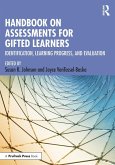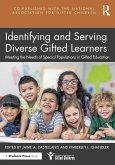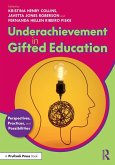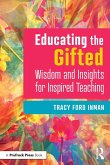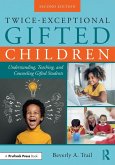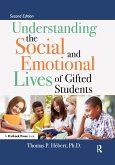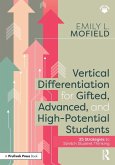Joyce VanTassel-Baska
Alternative Assessments With Gifted and Talented Students
Joyce VanTassel-Baska
Alternative Assessments With Gifted and Talented Students
- Broschiertes Buch
- Merkliste
- Auf die Merkliste
- Bewerten Bewerten
- Teilen
- Produkt teilen
- Produkterinnerung
- Produkterinnerung
Alternative Assessments With Gifted and Talented Students provides a concise and thorough introduction to methods for identifying gifted students in the school setting.
Andere Kunden interessierten sich auch für
![Handbook on Assessments for Gifted Learners Handbook on Assessments for Gifted Learners]() Handbook on Assessments for Gifted Learners46,99 €
Handbook on Assessments for Gifted Learners46,99 €![Identifying and Serving Diverse Gifted Learners Identifying and Serving Diverse Gifted Learners]() Identifying and Serving Diverse Gifted Learners41,99 €
Identifying and Serving Diverse Gifted Learners41,99 €![Underachievement in Gifted Education Underachievement in Gifted Education]() Underachievement in Gifted Education31,99 €
Underachievement in Gifted Education31,99 €![Educating the Gifted Educating the Gifted]() Tracy Ford InmanEducating the Gifted36,99 €
Tracy Ford InmanEducating the Gifted36,99 €![Twice-Exceptional Gifted Children Twice-Exceptional Gifted Children]() Beverly A. TrailTwice-Exceptional Gifted Children24,99 €
Beverly A. TrailTwice-Exceptional Gifted Children24,99 €![Understanding the Social and Emotional Lives of Gifted Students Understanding the Social and Emotional Lives of Gifted Students]() Thomas P. HébertUnderstanding the Social and Emotional Lives of Gifted Students100,99 €
Thomas P. HébertUnderstanding the Social and Emotional Lives of Gifted Students100,99 €![Vertical Differentiation for Gifted, Advanced, and High-Potential Students Vertical Differentiation for Gifted, Advanced, and High-Potential Students]() Emily L. MofieldVertical Differentiation for Gifted, Advanced, and High-Potential Students31,99 €
Emily L. MofieldVertical Differentiation for Gifted, Advanced, and High-Potential Students31,99 €-
-
-
Alternative Assessments With Gifted and Talented Students provides a concise and thorough introduction to methods for identifying gifted students in the school setting.
Hinweis: Dieser Artikel kann nur an eine deutsche Lieferadresse ausgeliefert werden.
Hinweis: Dieser Artikel kann nur an eine deutsche Lieferadresse ausgeliefert werden.
Produktdetails
- Produktdetails
- Verlag: Prufrock Press
- Seitenzahl: 350
- Erscheinungstermin: 1. Dezember 2007
- Englisch
- Abmessung: 152mm x 228mm x 23mm
- Gewicht: 506g
- ISBN-13: 9781593632984
- ISBN-10: 1593632983
- Artikelnr.: 23121926
- Herstellerkennzeichnung
- Libri GmbH
- Europaallee 1
- 36244 Bad Hersfeld
- gpsr@libri.de
- Verlag: Prufrock Press
- Seitenzahl: 350
- Erscheinungstermin: 1. Dezember 2007
- Englisch
- Abmessung: 152mm x 228mm x 23mm
- Gewicht: 506g
- ISBN-13: 9781593632984
- ISBN-10: 1593632983
- Artikelnr.: 23121926
- Herstellerkennzeichnung
- Libri GmbH
- Europaallee 1
- 36244 Bad Hersfeld
- gpsr@libri.de
Joyce VanTassel-Baska, Ed.D., is the Jody and Layton Smith Professor Emerita of Education and former Executive Director of the Center for Gifted Education at William & Mary in Virginia, where she developed a graduate program and a research and development center in gifted education. She also initiated and directed the Center for Talent Development at Northwestern University.
List of Tables List of Figures Acknowledgements 1. An Overview of
Alternative Assessment Measures for Gifted Learners and the Issues That
Surround Their Use 2. Nontraditional Strategies for Identifying
Nontraditional Gifted and Talented Students 3. Nonverbal Test Scores as One
Component of an Identification System: Integrating Ability, Achievement,
and Teacher Ratings 4. Traditional IQ: 100 Years of Misconception and Its
Relationship to Minority Representation in Gifted Programs 5. Using
Off-Level Testing and Assessment for Gifted and Talented Students 6.
Intelligence Testing and Cultural Diversity: The Need for Alternative
Instruments, Policies, and Procedures 7. Identifying Low-Income and
Minority Students for Gifted Programs: Academic and Affective Impact of
Performance-Based Assessment 8. The Rainbow Project: Using a Psychological
Theory of Giftedness to Improve the Identification of Gifted Children 9.
The Value of Traditional Assessments as Approaches to Identifying
Academically Gifted Students 10. Nontraditional Applications of Traditional
Testing 11. The Role of Creativity Tools and Measures 203 in Assessing
Potential and Growth 12. Portfolio Assessment of Gifted Students 13.
Product Assessment 14. Using Performance-Based Assessment to Document
Authentic Learning 15. Epilogue: What Do We Know About Identifying and
Assessing the Learning of Gifted Students? Appendix: Alternative Assessment
Tools for Gifted Learners About the Editor About the Authors
Alternative Assessment Measures for Gifted Learners and the Issues That
Surround Their Use 2. Nontraditional Strategies for Identifying
Nontraditional Gifted and Talented Students 3. Nonverbal Test Scores as One
Component of an Identification System: Integrating Ability, Achievement,
and Teacher Ratings 4. Traditional IQ: 100 Years of Misconception and Its
Relationship to Minority Representation in Gifted Programs 5. Using
Off-Level Testing and Assessment for Gifted and Talented Students 6.
Intelligence Testing and Cultural Diversity: The Need for Alternative
Instruments, Policies, and Procedures 7. Identifying Low-Income and
Minority Students for Gifted Programs: Academic and Affective Impact of
Performance-Based Assessment 8. The Rainbow Project: Using a Psychological
Theory of Giftedness to Improve the Identification of Gifted Children 9.
The Value of Traditional Assessments as Approaches to Identifying
Academically Gifted Students 10. Nontraditional Applications of Traditional
Testing 11. The Role of Creativity Tools and Measures 203 in Assessing
Potential and Growth 12. Portfolio Assessment of Gifted Students 13.
Product Assessment 14. Using Performance-Based Assessment to Document
Authentic Learning 15. Epilogue: What Do We Know About Identifying and
Assessing the Learning of Gifted Students? Appendix: Alternative Assessment
Tools for Gifted Learners About the Editor About the Authors
List of Tables List of Figures Acknowledgements 1. An Overview of
Alternative Assessment Measures for Gifted Learners and the Issues That
Surround Their Use 2. Nontraditional Strategies for Identifying
Nontraditional Gifted and Talented Students 3. Nonverbal Test Scores as One
Component of an Identification System: Integrating Ability, Achievement,
and Teacher Ratings 4. Traditional IQ: 100 Years of Misconception and Its
Relationship to Minority Representation in Gifted Programs 5. Using
Off-Level Testing and Assessment for Gifted and Talented Students 6.
Intelligence Testing and Cultural Diversity: The Need for Alternative
Instruments, Policies, and Procedures 7. Identifying Low-Income and
Minority Students for Gifted Programs: Academic and Affective Impact of
Performance-Based Assessment 8. The Rainbow Project: Using a Psychological
Theory of Giftedness to Improve the Identification of Gifted Children 9.
The Value of Traditional Assessments as Approaches to Identifying
Academically Gifted Students 10. Nontraditional Applications of Traditional
Testing 11. The Role of Creativity Tools and Measures 203 in Assessing
Potential and Growth 12. Portfolio Assessment of Gifted Students 13.
Product Assessment 14. Using Performance-Based Assessment to Document
Authentic Learning 15. Epilogue: What Do We Know About Identifying and
Assessing the Learning of Gifted Students? Appendix: Alternative Assessment
Tools for Gifted Learners About the Editor About the Authors
Alternative Assessment Measures for Gifted Learners and the Issues That
Surround Their Use 2. Nontraditional Strategies for Identifying
Nontraditional Gifted and Talented Students 3. Nonverbal Test Scores as One
Component of an Identification System: Integrating Ability, Achievement,
and Teacher Ratings 4. Traditional IQ: 100 Years of Misconception and Its
Relationship to Minority Representation in Gifted Programs 5. Using
Off-Level Testing and Assessment for Gifted and Talented Students 6.
Intelligence Testing and Cultural Diversity: The Need for Alternative
Instruments, Policies, and Procedures 7. Identifying Low-Income and
Minority Students for Gifted Programs: Academic and Affective Impact of
Performance-Based Assessment 8. The Rainbow Project: Using a Psychological
Theory of Giftedness to Improve the Identification of Gifted Children 9.
The Value of Traditional Assessments as Approaches to Identifying
Academically Gifted Students 10. Nontraditional Applications of Traditional
Testing 11. The Role of Creativity Tools and Measures 203 in Assessing
Potential and Growth 12. Portfolio Assessment of Gifted Students 13.
Product Assessment 14. Using Performance-Based Assessment to Document
Authentic Learning 15. Epilogue: What Do We Know About Identifying and
Assessing the Learning of Gifted Students? Appendix: Alternative Assessment
Tools for Gifted Learners About the Editor About the Authors


